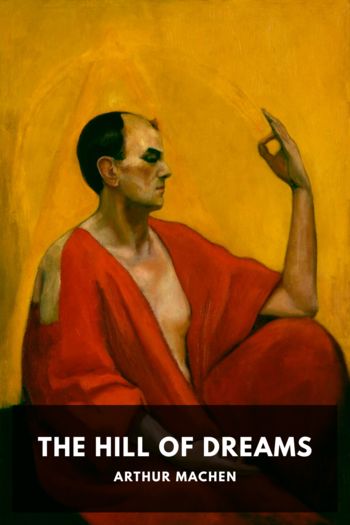Short Fiction by Arthur Machen (ebook reader .txt) 📕

- Author: Arthur Machen
Book online «Short Fiction by Arthur Machen (ebook reader .txt) 📕». Author Arthur Machen
“It seems a little strange.”
“I think not. The murderer murders not from positive qualities, but from negative ones; he lacks something which non-murderers possess. Evil, of course, is wholly positive—only it is on the wrong side. You may believe me that sin in its proper sense is very rare; it is probable that there have been far fewer sinners than saints. Yes, your standpoint is all very well for practical, social purposes; we are naturally inclined to think that a person who is very disagreeable to us must be a very great sinner! It is very disagreeable to have one’s pocket picked, and we pronounce the thief to be a very great sinner. In truth, he is merely an undeveloped man. He cannot be a saint, of course; but he may be, and often is, an infinitely better creature than thousands who have never broken a single commandment. He is a great nuisance to us, I admit, and we very properly lock him up if we catch him; but between his troublesome and unsocial action and evil—Oh, the connection is of the weakest.”
It was getting very late. The man who had brought Cotgrave had probably heard all this before, since he assisted with a bland and judicious smile, but Cotgrave began to think that his “lunatic” was turning into a sage.
“Do you know,” he said, “you interest me immensely? You think, then, that we do not understand the real nature of evil?”
“No, I don’t think we do. We overestimate it and we underestimate it. We take the very numerous infractions of our social ‘bylaws’—the very necessary and very proper regulations which keep the human company together—and we get frightened at the prevalence of ‘sin’ and ‘evil.’ But this is really nonsense. Take theft, for example. Have you any horror at the thought of Robin Hood, of the Highland caterans of the seventeenth century, of the moss-troopers, of the company promoters of our day?
“Then, on the other hand, we underrate evil. We attach such an enormous importance to the ‘sin’ of meddling with our pockets (and our wives) that we have quite forgotten the awfulness of real sin.”
“And what is sin?” said Cotgrave.
“I think I must reply to your question by another. What would your feelings be, seriously, if your cat or your dog began to talk to you, and to dispute with you in human accents? You would be overwhelmed with horror. I am sure of it. And if the roses in your garden sang a weird song, you would go mad. And suppose the stones in the road began to swell and grow before your eyes, and if the pebble that you noticed at night had shot out stony blossoms in the morning?
“Well, these examples may give you some notion of what sin really is.”
“Look here,” said the third man, hitherto placid, “you two seem pretty well wound up. But I’m going home. I’ve missed my tram, and I shall have to walk.”
Ambrose and Cotgrave seemed to settle down more profoundly when the other had gone out into the early misty morning and the pale light of the lamps.
“You astonish me,” said Cotgrave. “I had never thought of that. If that is really so, one must turn everything upside down. Then the essence of sin really is—”
“In the taking of heaven by storm, it seems to me,” said Ambrose. “It appears to me that it is simply an attempt to penetrate into another and higher sphere in a forbidden manner. You can understand why it is so rare. There are few, indeed, who wish to penetrate into other spheres, higher or lower, in ways allowed or forbidden. Men, in the mass, are amply content with life as they find it. Therefore there are few saints, and sinners (in the proper sense) are fewer still, and men of genius, who partake sometimes of each character, are rare also. Yes; on the whole, it is, perhaps, harder to be a great sinner than a great saint.”
“There is something profoundly unnatural about sin? Is that what you mean?”
“Exactly. Holiness requires as great, or almost as great, an effort; but holiness works on lines that were natural once; it is an effort to recover the ecstasy that was before the Fall. But sin is an effort to gain the ecstasy and the knowledge that pertain alone to angels, and in making this effort man becomes a demon. I told you that the mere murderer is not therefore a sinner; that is true, but the sinner is sometimes a murderer. Gilles de Raiz is an instance. So you see that while the good and the evil are unnatural to man as he now is—to man the social, civilized being—evil is unnatural in a much deeper sense than good. The saint endeavours to recover a





Comments (0)